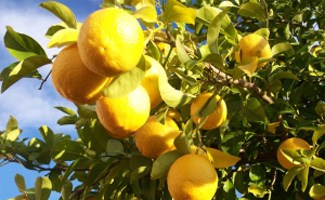The Key to Growing the Most Expensive Lemons in the World
 When it comes to growing lemons, or any type of fruit or vegetable, we rarely stop to think about the energy and resources utilized to grow them. In this article we will take a look at what it takes to grow some of the world’s most expensive lemons in Israel.
When it comes to growing lemons, or any type of fruit or vegetable, we rarely stop to think about the energy and resources utilized to grow them. In this article we will take a look at what it takes to grow some of the world’s most expensive lemons in Israel.
Why it is so Difficult to Grow Lemons in Israel
Israel is a region surrounded by desert and an area where droughts come one after the other and this is the main reason why it is so difficult to grow… anything, in Israel. The water that most plants or trees require is water that simply cannot be spared in an area such as Israel. Water is a precious commodity and how the people of this country use and share water is a question that receives much attention from people of all walks of life. So when it comes to gardening, there is simply the question of whether the water can be spared.
Why is Water Such a Commodity in Israel?
The Israeli’s and the Palestinians
To many people who have frequent access to water without any limitations, the idea of water being so limited that even gardening is questioned, is unfathomable. To the people of Israel this is simply the way of things. Many news outlets claim that the lack of available water is a result of tensions between Israel and Palestine, often pinning the lack of available water on each other and further fueling political turmoil. While the issue of how the available water supply is being shared is of importance to both the people of Israel and the people of Palestine, the more important issue is the bigger picture.
The Drying up of Natural Water Resources
The bigger picture, when it comes to the availability of water in Israel, is the drying up of the natural water resources in the area. The natural lakes and rivers that support life from tree’s to livestock to people are rapidly drying out. At one time the great river Jordan carried large flows of water from the Sea of Galilee to the Dead Sea and on its journey it would quench the thirst of Palestine, Jordan and Israel. So amazing were the waters of the river Jordan that they once turned the great turbines of a hydro-electric power plant that now stands a ghost of its former days. Yet today there are areas of the river Jordan that offer no more than a trickle of dirty muddy water, polluted and offering nothing to quench the deserts thirst.
Why Has the River Jordan Dried Up So Much?
If the river Jordan was once so great, how did it become such a small shadow of its former self? The sheer amount of water that is relied upon by the people of Israel and their neighbors has simply drained the river to an all time low. As Israel pumps water from the Sea of Galilee to support its national water supply, neighboring Arab countries rely upon the waters that feed the Sea Galilee. Just how devastating has the water loss been to the Dead Sea in to which the River Jordan once poured like a mighty waterfall? According to studies the Dead Sea is shrinking at a rate of one meter every year. So rapidly is the Dead Sea shrinking that in just over a century it could have completely dried up. Today the Dead Sea is just two thirds of the size that it once was in the 1930’s.
The Wasted Water of Israel
Many people ask: but where does this water come from? And in most instances they are directing their exclamation towards lush green grasses on top of the line golf courses planted smack in the middle of an otherwise barren land. They make a good point. The water that is being utilized to keep artificial and non-native plant life and grass alive is water that could certainly be better used elsewhere. As with most things however, it seems that he who has the gold makes the rules and this is precisely why it takes so much to simply grow a lemon tree in Israel.
Kevin Connolly’s Lemon Tree
The analogy of the most expensive lemons in the world is one that comes from a true story of Kevin Connolly. Connolly is a news correspondent living in Israel and during his time there he opted to ship in a fully grown lemon tree as conditions were simply not conducive to growing one from a sapling. Connolly shares his story of having to pay to have the tree shipped in and just how un-economical keeping a lemon tree has been when living in such a drought ridden country. Most importantly, however, Connolly explains that his tree, which undoubtedly bears the most expensive lemons in the world, requires a small irrigation system that stands on his balcony. This tiny irrigation system that provides a lifeline for a single tree also provides an eye opening moment for Connolly as he realizes that with every short watering his tree receives, the Dead Sea likely shrinks just a little bit more. For some, this analogy may seem ridiculous; however, in looking at the rapidly shrinking water supply in Israel and the surrounding countries this analogy is seeming to be less and less of an exaggeration.
What can be done?
When asked what can be done about the current water situation in Israel and the surrounding areas, very few people have an answer and even fewer have an answer that is feasible. Whether the steadily shrinking water supply of Israel is due to the Israeli’s or Palestinians is a moot point. What should be addressed is that regardless of how the shrinking water supply is explained away, there are countries full of people who cannot survive without it. It is time to stop pointing fingers and to begin seeking solutions that can help return a roaring natural water source to all of these people.



